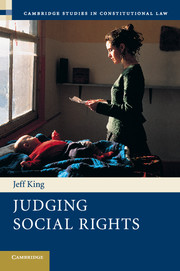Crossref Citations
This Book has been
cited by the following publications. This list is generated based on data provided by Crossref.
O'Brien, Nick
2012.
Social rights and civil society: ‘Giving Force’ without ‘Enforcement’.
Journal of Social Welfare and Family Law,
Vol. 34,
Issue. 4,
p.
459.
King, Jeff
2013.
Social and Political Foundations of Constitutions.
p.
73.
O’Cinneide, Colm
2014.
Economic and Social Rights after the Global Financial Crisis.
p.
169.
Sampaio, Jorge Silva
2015.
Judicial Activism.
Vol. 44,
Issue. ,
p.
137.
Sunkin, Maurice
2015.
The Cambridge Companion to Public Law.
p.
236.
Rosser, Andrew
2015.
Realising Rights in Low Quality Democracies: Instructive Asian Cases.
Asian Studies Review,
Vol. 39,
Issue. 2,
p.
180.
Morales, Leticia
2015.
Taking Facts Seriously: Judicial Intervention in Public Health Controversies.
Public Health Ethics,
Vol. 8,
Issue. 2,
p.
185.
Loughlin, Martin
2015.
The Constitutional Imagination.
The Modern Law Review,
Vol. 78,
Issue. 1,
p.
1.
Arosemena, Gustavo
2015.
Retrieving the Differences: the Distinctiveness of the Welfare Aspect of Human Rights from the Perspective of Judicial Protection.
Human Rights Review,
Vol. 16,
Issue. 3,
p.
239.
2015.
Proportionality and Deference in Investor-State Arbitration.
p.
172.
Eichenhofer, Eberhard
2015.
Common European Legal Thinking.
p.
343.
Brinks, Daniel M.
Gauri, Varun
and
Shen, Kyle
2015.
Social Rights Constitutionalism: Negotiating the Tension Between the Universal and the Particular.
Annual Review of Law and Social Science,
Vol. 11,
Issue. 1,
p.
289.
Howarth, David
2015.
The Cambridge Companion to Public Law.
p.
37.
Langford, Malcolm
2015.
Rights, Development and Critical Modernity.
Development and Change,
Vol. 46,
Issue. 4,
p.
777.
De Wispelaere, Jurgen
and
Morales, Leticia
2016.
The stability of basic income: a constitutional solution for a political problem?.
Journal of Public Policy,
Vol. 36,
Issue. 4,
p.
521.
Boyle, Katie
2016.
Justiciability of Human Rights Law in Domestic Jurisdictions.
p.
173.
Gargarella, Roberto
2016.
Democratizing Constitutional Law.
Vol. 113,
Issue. ,
p.
119.
Diver, Alice
2016.
Justiciability of Human Rights Law in Domestic Jurisdictions.
p.
333.
Sigafoos, Jennifer
2016.
Using equality legislation as a sword.
International Journal of Discrimination and the Law,
Vol. 16,
Issue. 2-3,
p.
66.
Langford, Malcolm
Rodríguez-Garavito, César
and
Rossi, Julieta
2017.
Social Rights Judgments and the Politics of Compliance.
p.
3.



